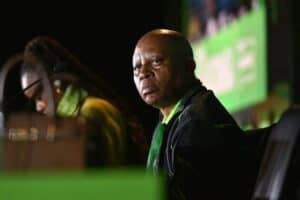More than anything, as a young voter I feel a sense of urgency around this election.

With the 2024 general election drawing closer, I have been reading a lot about how young people in South Africa should participate in the election and how crucial it is to build an inclusive society and strong democratic institutions.
In recent months, I have been having a push-and-pull moment – when the door says push and you’re so absent-minded that you miss the sign and you pull – battling with whether or not the elections are worth me participating.
ALSO READ: Ramaphosa urges ANCYL to attract young voters, tackle youth unemployment
I understand all facets of society must be represented for SA’s political system to be representational, especially as a young person.
We know that young people are excluded from political participation, a sizeable sector of the population has little to no voice or influence in decisions that have an impact on them. The country’s political system being undermined because of a lack of representativeness is a major effect.
However, contrary to popular belief, these are conversations young people are having on social media, via tweets, spaces and even hashtags; it has shown a little bit of unity and steps in the right direction.
And with a unified voice, many don’t want to see a party which has led this country into democracy, but failed it with continued corruption, greed, and failure to hold each other accountable continuing to drown and sink it.
ALSO READ: Five tips for young jobseekers
However, unified as we might be in terms of what we do not want to see beyond 2024 – the lack of service delivery, distrust in the electoral and political processes and continued high youth unemployment, among others – it seems we can’t decide who is worth the chance.
Younger people are often described as politically indifferent or uninterested. While it is true that younger South Africans have voted less than older ones, indifference is only one aspect of the jigsaw for young people – and it is not even the most crucial one.
Many young people think voting won’t alter the system and some think all the candidates are the same. This, for me, causes barriers to voting, which suggests that they may genuinely find it more difficult to cast a ballot.
ALSO READ: The financial habits young people need
From the conversations I have had with my peers, despite the many parties we have in the country, none of them really speaks to me and for me, from what I have seen, and that is the number one concern.
Scandals and rumours follow almost every politician around, making them an even less likely candidate. Moreover, this has left many discouraged from voting.
I just find myself thinking, “could the devil I know be better than the devil I think deserves a chance?” Or could we all just have it wrong and still endure the “beauty and the beast” relationship we have with the ruling party.
Still, without the vision and unified voice of who might be better than the ANC, we’ll just find ourselves gravitating towards the same party or even giving them another chance to break up even more than they already have.
It’s clear we are not changing the minds and opinions of older people in the country –because no matter what, they will always hold on to the ANC for dear life. But what should be equally as clear is that they cannot outvote us, because, more than anything, as a young voter I feel a sense of urgency around this election.
ALSO READ: Being young is not about your age, but how you contribute to society
But that urgency also comes with the fear of making the right choice, not following the noise, and just leaning into what might seem right for me and the rest of the country, because despite the future of our country – which could be doomed or saved. Nonetheless, it still rests on our shoulders. So, no pressure, but can we please not mess it up?
Support Local Journalism
Add The Citizen as a Preferred Source on Google and follow us on Google News to see more of our trusted reporting in Google News and Top Stories.






